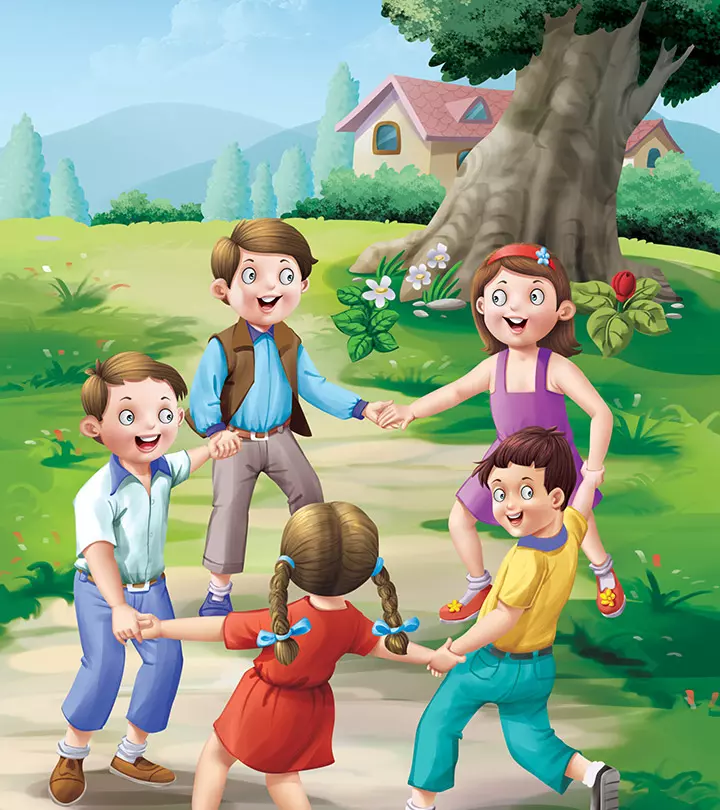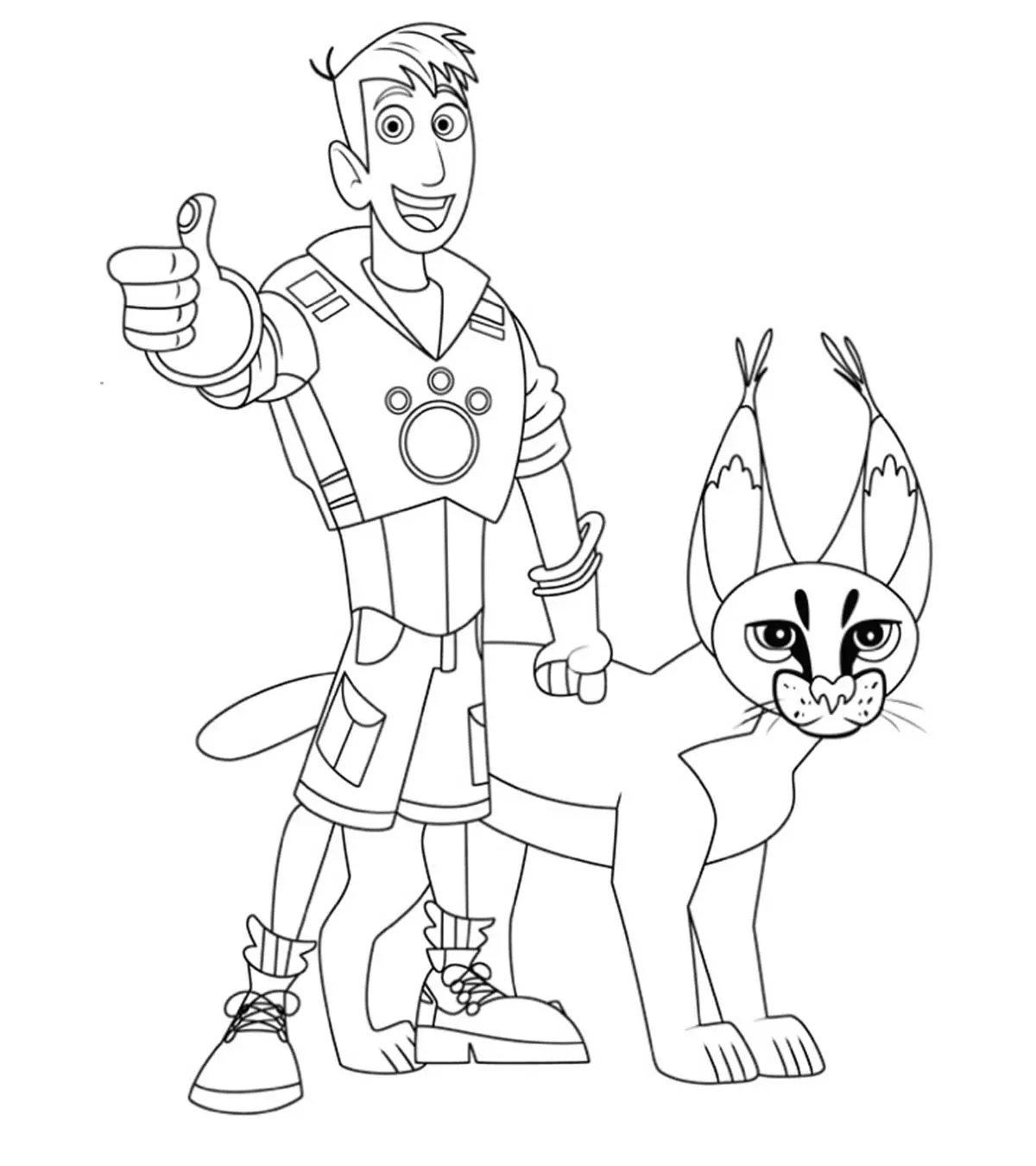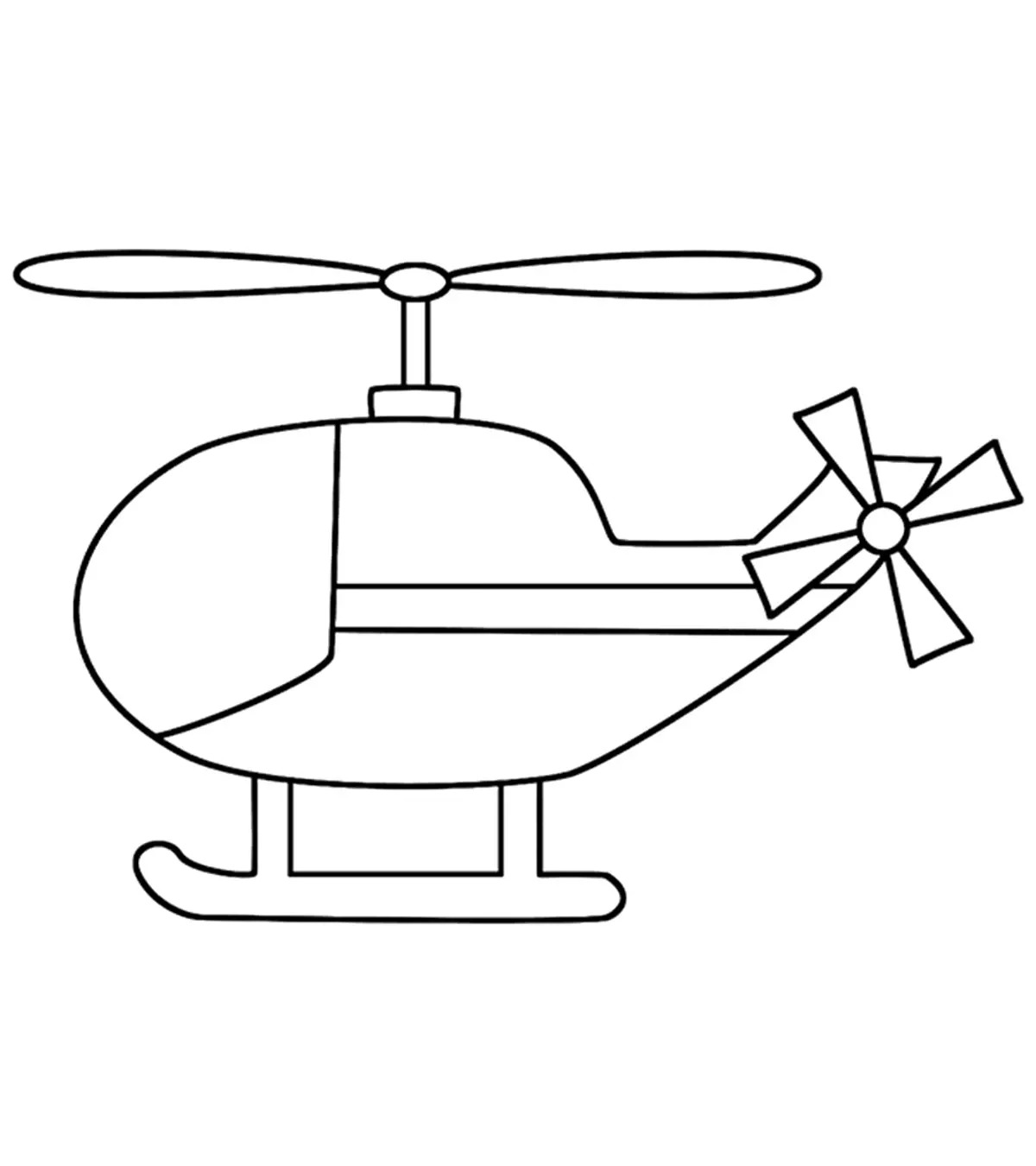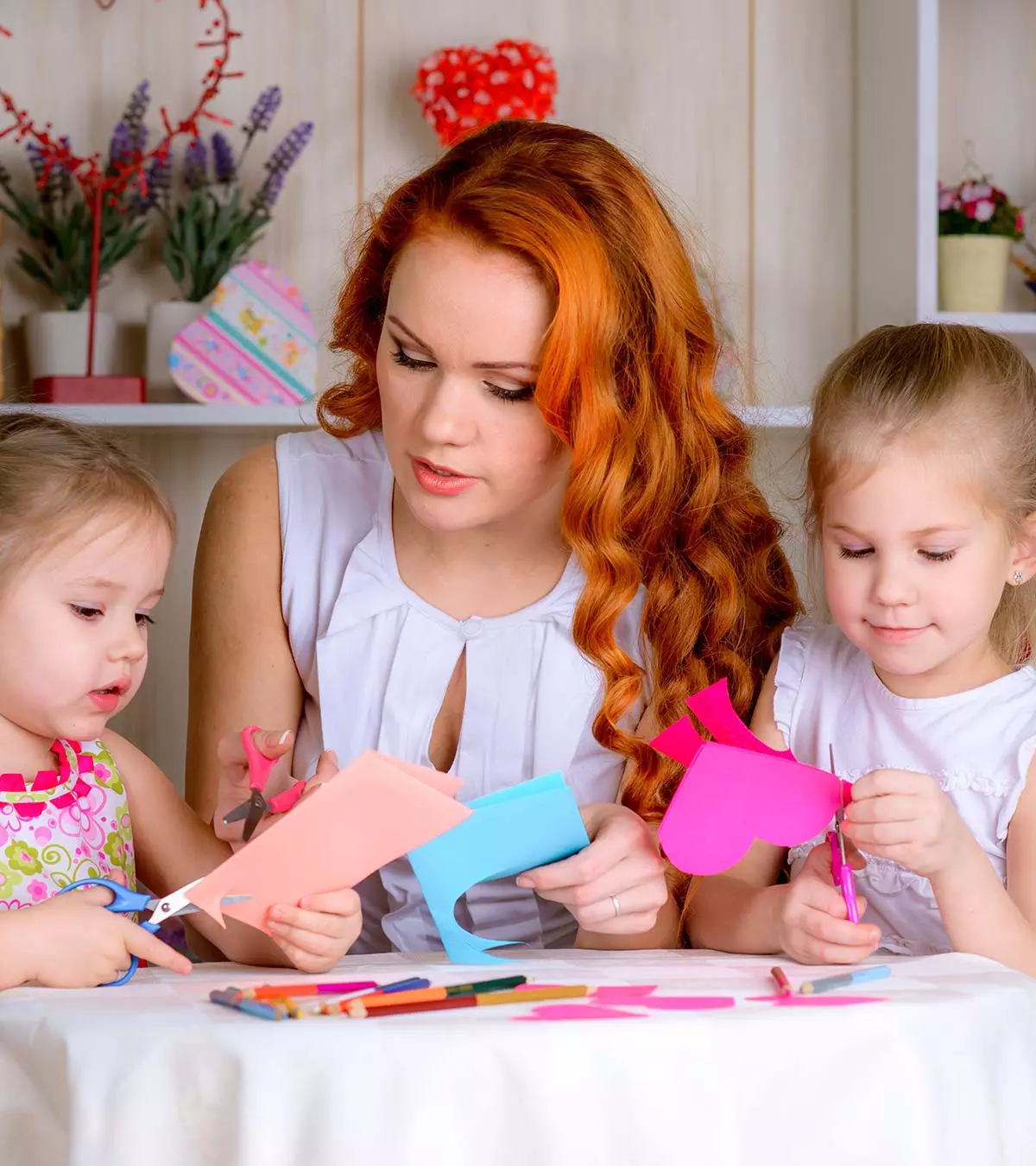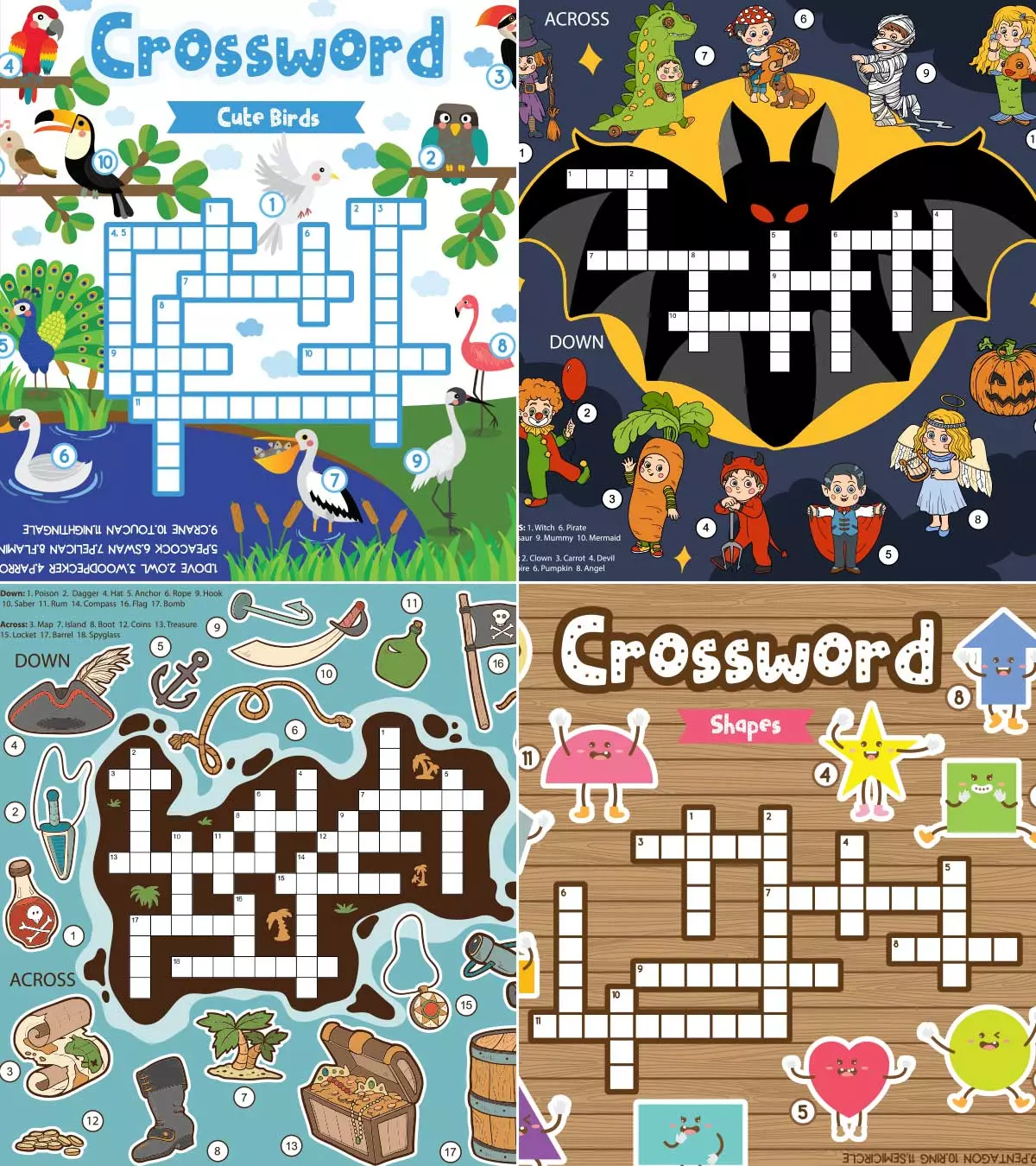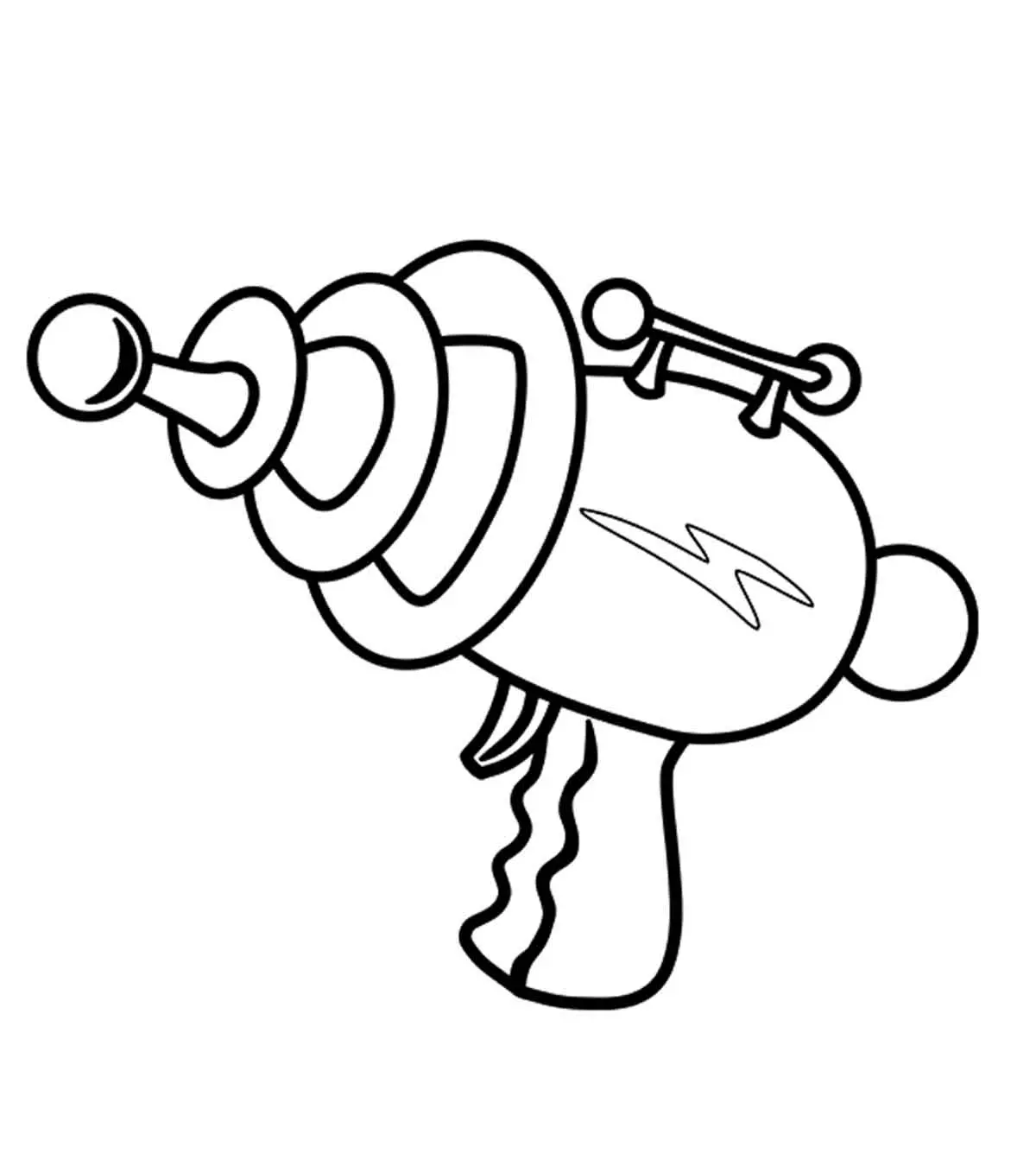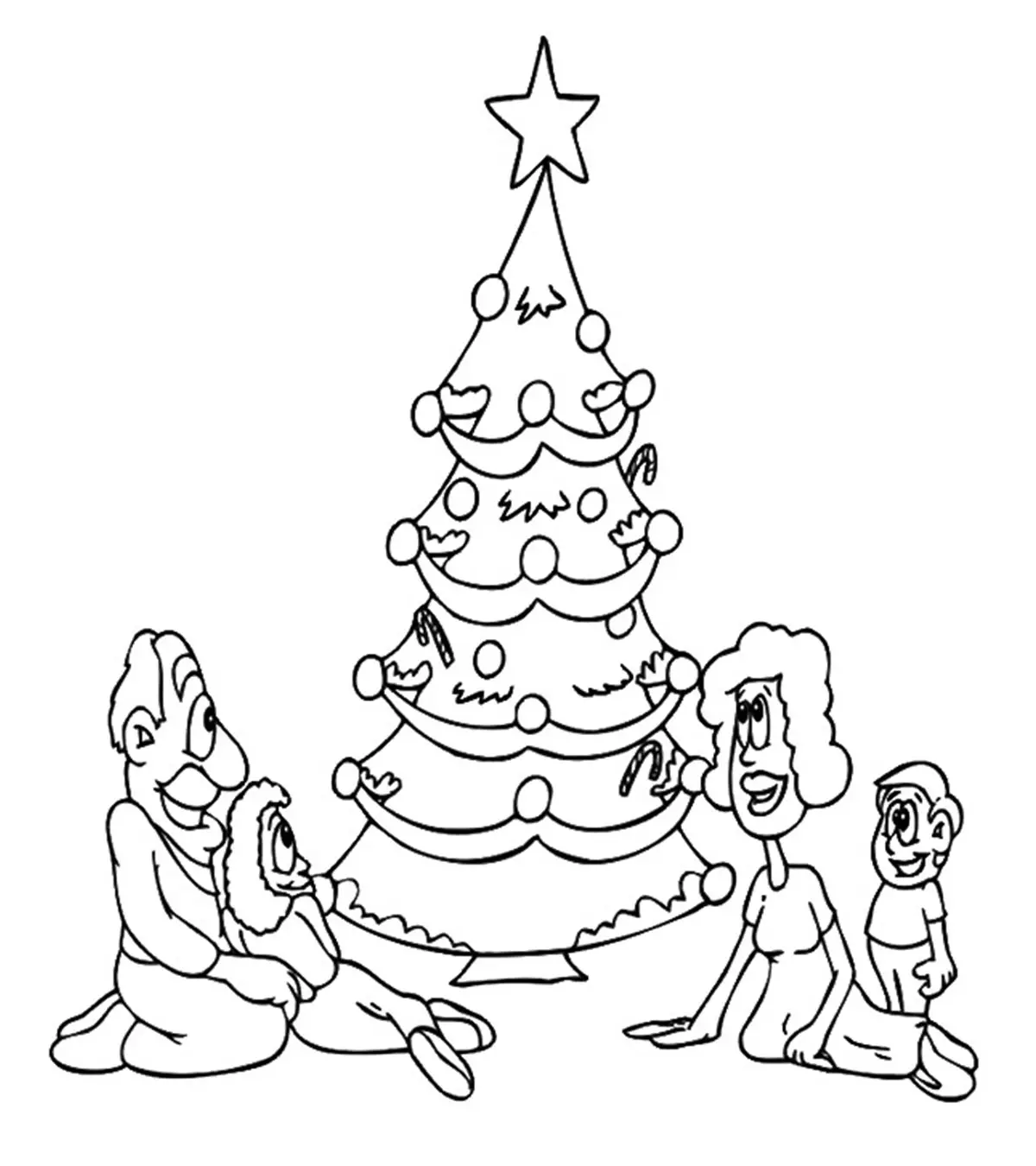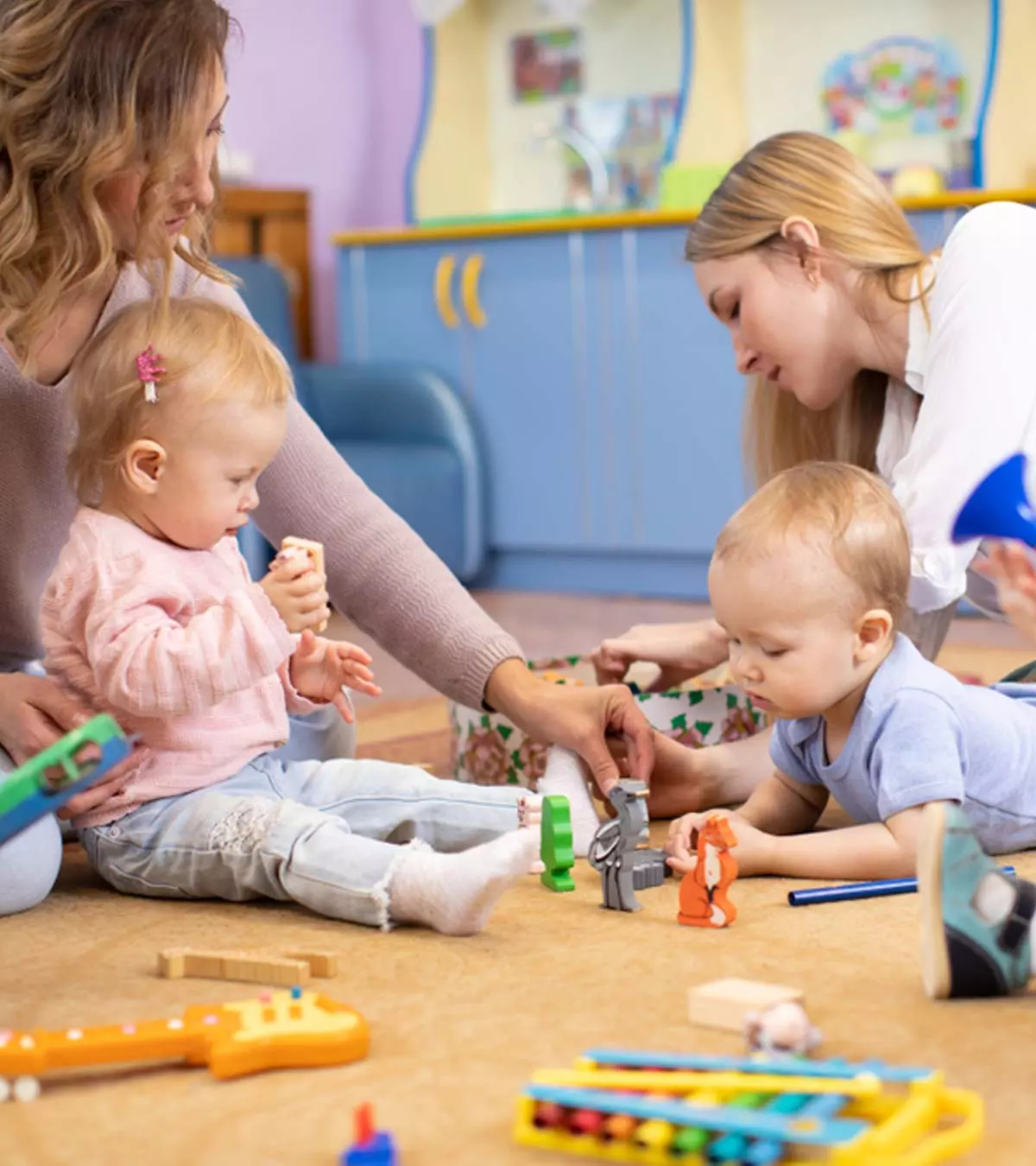
Image: Shutterstock
Three-year-olds are quite energetic and lively and keep parents and other family members on their toes. Interesting activities for three-year-olds can help parents channel their energy in the right direction. While their concentration span increases with age, they may be more restless in satiating their curiosity to explore new things. However, toys or games may not hold a three-year-old’s interest for very long. You have to come up with activities that would cater to their preferences and interests. In this post, we bring you a list of amusing and educational indoor and outdoor activities after considering their benefits. Keep reading to pick the best one and keep your three-year-old engaged.

Key Pointers
- Art and craft activities can improve creativity and cognition in three-year-olds.
- Sensory activities, such as playdough crafts benefit a child’s brain growth.
- Games such as color and shape sorters can help three-year-olds learn new colors and shapes.
What Are The Skills Your Child Develops At Three Years?
At three years, children achieve significant milestones. However, the pace may vary from one child to another (1)(2)(3). You could expect your child to achieve the following milestones at this age.
- Views self as a whole person involving body, mind, and feelings
- Can concentrate on tasks for eight to nine minutes.
- Initiates basic conversations, asks questions, and describes actions from pictures or books.
- Articulates their name and expresses themselves more clearly.
- Speaks well enough for others to understand. Can speak in two- to three-word or four- to five-word sentences.
- Understands size differences such as big and little and the tenses.
- Can draw a circle and understand safety precautions, such as not touching hot objects or not playing with a knife.
- Can wear clothes themselves. Learns to put on a T-shirt or pants.
- Can go up and down the stairs without support.
- Establishes bladder and bowel control and is comfortable using a potty chair.
35+ Activities For Three-Year-Olds
Arts And Crafts To Improve Creativity
Art and craft activities are said to improve children’s cognitive abilities as they enable them to use multiple areas of the brain. Using both their hands and fingers also encourages the development of muscles in those areas and could improve their fine motor skillsiSet of abilities that help move and control various body parts, especially hands, legs, and fingers. . Here are a few art and craft activities for three-year-old kids.
1. Fabric painting
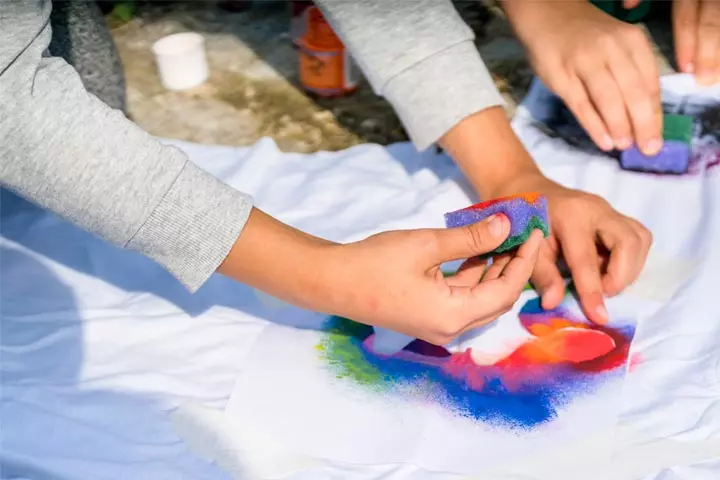
For a three-year-old child, fabric painting could be something basic to teach them a few painting techniques, shapes, and colors. As they have fun playing with shapes on the fabric, they will stay away from screens and learn new things.
You will need
Old fabric or T-shirts, fabric colors, stencils or chart papers, small sponges
How to do
- Get ready-made stencils or take a thick chart paper and make some shapes like stars, hearts, drops, etc., in it to make your stencil.
- Tape the stencil on the fabric and ask your kids to fill it with color using the sponge.
- Once they are done, remove the tape and stencil to find surprisingly perfect shapes.
- Repeat the process in different parts of the fabric to get a beautifully painted fabric.
How it helps: Using sponges improves their motor skills and helps them learn about shapes.
2. Drawing or painting
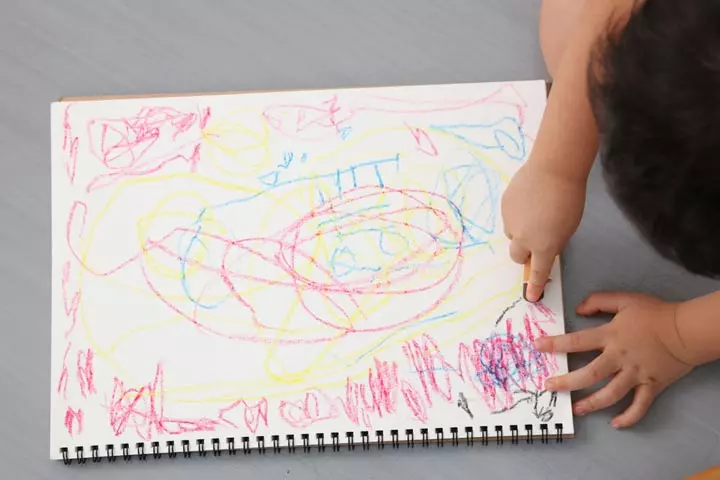
You cannot ask a three-year-old to draw a masterpiece. Instead, you can help them paint or draw something with easily available tools. Drawing or painting is one of the most engaging cognitive activities for toddlers.
You will need
A paper or a drawing book, water colors or acrylic paints or crayons, pencil, fork, brushes, or sponges.
How to do
- Get them an appealing coloring book and ask them to fill the images in it with colors as in the reference image.
- You can also draw some simple geometric figures like squares, circles, or triangles and ask them to color them.
How it helps: Promotes self-expression and sparks creativity.
3. Pot painting

Get a plain terracotta or a clay pot from your garden and let your kids add color to it. Be open-ended so that your kids use their creativity to make it beautiful in their way by playing with clay pots and colors, even if it is not perfect.
You will need
A small empty clay pot, bright colored acrylic paints, wax paper, and a newspaper.
How to do
- Spread the newspaper on the floor, followed by the wax paper. Keep the clay pot upside down on the wax paper.
- Squeeze acrylic paints around the pot’s edge so that it drips down and colors the sides of the pot. Take one color at a time and do it one after the other.
- Don’t let the paints dry in between. Once the pot is completely covered, let it dry for at least a day.
- You can also keep the canvas clear with a base coat of white or black and ask your kids to paint whatever they wish.
How it helps: Enhances hand-eye coordination, concentration, and patience.
4. Stamp painting

This is one of the easiest ways to make your kid paint different patterns without much effort. You can use a variety of objects to create beautiful patterns with this art form.
You will need
Potatoes, lady’s finger, onion, natural flowers, leaves, cookie-cutter, knife, paints, drawing paper, and brushes.
How to do
- This depends on the kind of object you choose. Let’s take a big potato, cut it into half, and with the help of a cookie cutter or a knife, make some shapes out of it. Remove the excess portion, and your stamp is ready.
- Hand it over to your little one along with some paints.
- Simply dip the stamp or paint the stamp with color and press it over a drawing paper or a fabric.
- Once they stamp at different places, you can simply join them with branches. Add leaves and pot to make a flower pot or bouquet.
- You can also use other objects like onions, ladyfingers, flowers, and leaves to make natural patterns.
How it helps: Improves fine motor skills and allows sensory exploration.
5. Cup painting
You can paint the cups and also make different creatures using painted paper cups and everyday items.
You will need
White paper cups, paints, brushes or sponges, chart papers.
How to do
- Give a base coat to the cups with the color of the creature. Let’s say you’re making a chicken. Paint the cup yellow.
- Draw its eyes with black and white, and nose red.
- Cut the red chart paper to make its crown and feet and paste them on the top and bottom of the cup, respectively.
- Similarly, your kids can create different characters like Peppa pig, angry bird, frog, etc.
How it helps: Helps develop color recognition, spatial awareness, and self-expression.
6. Paper plate crafts

Just like paper cup crafts, the paper plate painting is quite interesting to do. You can make paper plate fans, paper plate turtles, and paper plate sunshine.
You will need
Disposable paper plates, paints, brushes, color charts, ice cream sticks, etc.
How to do
- Take a paper plate, flip it towards its bottom, and color it with your favorite color or multiple colors.
- Take the colored paper and cut it into six shapes: four feet, one head, and a tail.
- On the head, draw the turtle’s eyes, nose, and mouth.
- Stick all six shapes to the turtle, and that’s it, your paper plate turtle is ready.
- You can also make a ladybug in the same way.
How it helps: Stimulates imagination, improves verbal skills, and encourages self-expression.
 Caution
Caution7. Bird feeders
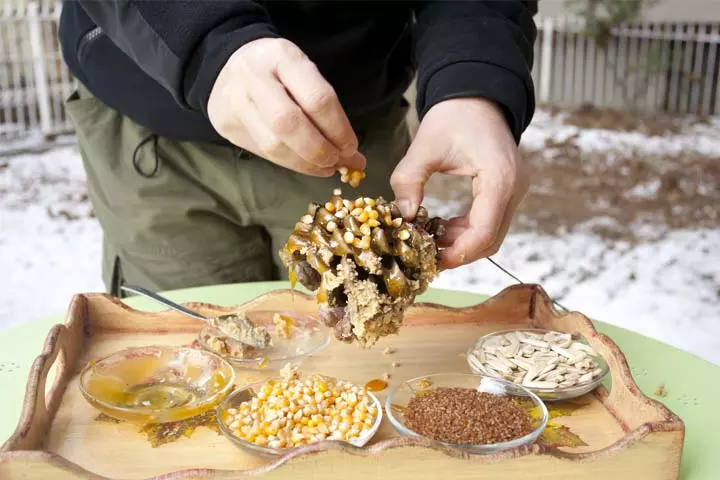
A nature craft idea for three-year-olds is bird feeders of different varieties, shapes, and sizes. A well-made one is sure to attract birds to your garden.
You will need
Empty tissue paper rolls, birdseed, twine thread, vegetable shortening, popsicle sticks, and a plate.
How to do
- Using the popsicle stick, ask your kid to spread the vegetable shortening on the empty tissue roll. This makes the paper roll water-resistant and helps it to hold the feed in place.
- Take the bird feed on a plate and roll the tissue roll over the feed. Make sure the feed gets stuck to the roll completely.
- Pass the twine through the tissue roll and tie it at one end, and your handmade bird feeder is ready.
- Hang the feeder to any tree in your garden.
- You can also use pine cones or cardboard to make different feeders.
How it helps: Introduces children to nature and teaches them to care for animals.
Sensory Developmental Activities
Sensory activities for kids stimulate their senses like touch, smell, taste, sight, hearing, balance, and movement. The benefits of sensory activities could include language development, development of fine motor skills, and problem-solving. Listed below are a variety of sensory development activities that would stimulate your child’s senses differently.
8. Playdough crafts

Playdough is a popular activity that encourages creativity in children. But if your three-year-old has the habit of putting everything in the mouth, you need to exercise some caution. In such cases, you can opt for homemade edible playdough.
You will need
Colorful play dough, cookie cutters, play scissors, popsicle sticks, etc.
How to do
- Use the play dough to make a simple ball, roll into a snake shape, and flatten it with hands or a rolling pin.
- Give them a cookie cutter or play scissors and help them make small animals and objects.
How it helps: Improve their knowledge of animals and fosters creativity.
You can also make salt dough at home as a non-toxic alternative. Alison, a mother of two, shares her experience of doing so for her young daughter. She says, ”For a young toddler who loves getting her hands into everything, salt dough was a perfect medium instead of play dough as we got to cook, paint, and keep some of the end results afterward which will last forever. To make up the dough, you’ll need:1 cup flour, 1/2 cup salt, and 1/3 cup water with some extra flour for the dusting surface.
“You can get the kids involved in this step too – it’s a messy but really great sensory experience for them as they turn gooey flour and water into a salty dough. Find random objects from around the house. I found some cookie cutters, blunt cutlery, pencils, jam jars, and stamps… Let them loose! my daughter played about with different items in the dough for absolutely ages which was brilliant – it kept her busy, entertained, and learning new shapes and textures (i).”
9. Pasta bin activity
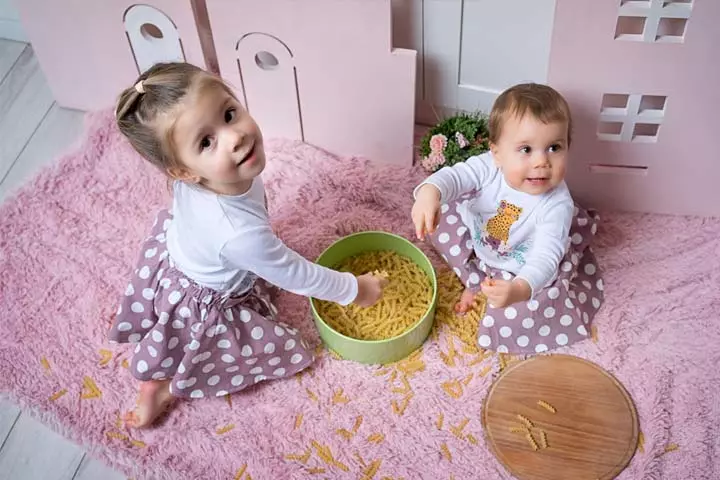
With a few items available at home, you can try this activity to keep your child engaged for hours.
You will need
Pasta noodles, a big basket, bottles with caps, measuring jars or cups, a blanket.
How to do
- Take a big basket and fill it with pasta or macaroni.
- Give the empty bottles to your kids.
- Ask them to fill the bottles with pasta using the measuring jars.
- Once they fill all the bottles, they need to empty them and refill them.
- For the sense of sound, ask them to fill each bottle to the half, secure the lid, and shake it. Ask them to observe how each bottle sounds different, quieter, or louder. Change the quantity of pasta and ask them to check the sound again. Albeit a bit noisy, this activity can be fun.
How it helps: Develops their senses of touch and sound.
10. Frozen treasure
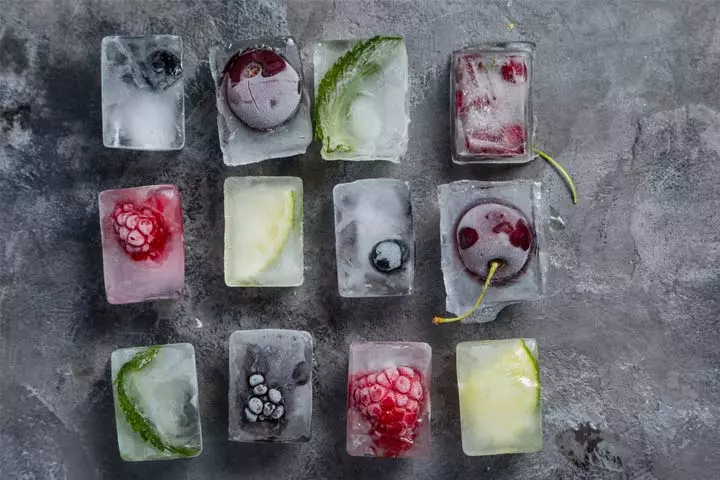
This sensory activity for three-year-olds requires pre-planning and execution by the parent. It is quite apt during the summer to beat the heat.
You will need
Fresh fruits or small toy figures, freezer-safe containers, a kid-friendly tool kit with a hammer, screwdriver, and pliers, and a big tub.
How to do
- A day before the activity, fill the freezer-safe containers with small fruits like berries, grapes, and cherries, add water, and freeze them. Fill four to five containers with different colored fruits and freeze them overnight.
- On the day of the activity, remove all the ice blocks from the containers and put them in a big tub.
- Hand over the tool kit to your toddlers and ask them to dig and find what’s hidden.
How it helps: Enhances fine motor skills and sensory development.
11. Animal sound game
This activity of guessing the sound helps your child develop the hearing ability and also the ability to memorize things.
It’s simple and does not require any crafting supplies.
You will need
A phone or a laptop.
How to do
- Download some animal sounds, vehicle noises, and bird chirpings.
- Play them for your children and ask them to guess the sound.
- If they’re not familiar at first, tell them what the sound is.
- Repeat the sounds till they can imitate them and recognize them.
- Play the guessing game by changing the order in which the sounds are played.
How it helps: Aids auditory development and the ability to memorize and recall.
12. Smell it and tell it
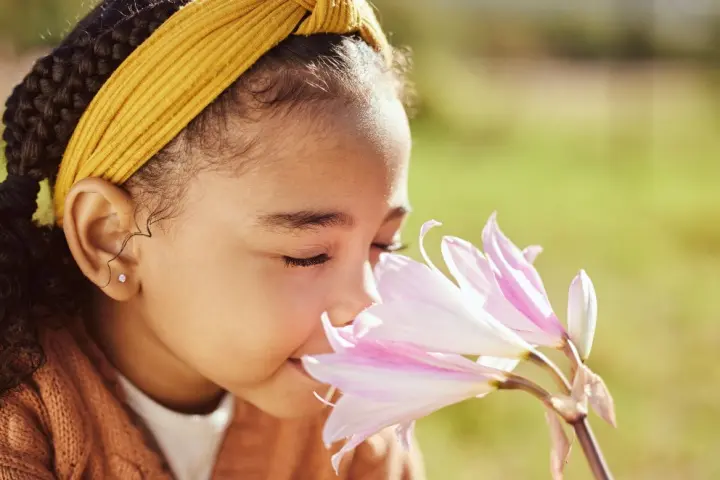
This is similar to the Guess the Sound game; only here, kids have to smell different objects and identify them. They could be edible or non-edible items but must have a unique that makes it easier for them to guess.
You will need
Fresh fruits, flowers, soaps, perfumes, a cloth to blind fold, etc.
How to do
- Blindfold your children with a soft cloth and keep various objects before them.
- Ask them to pick one at a time, smell it, and guess what it is.
- Score them for every correct guess and keep aside the incorrectly guessed objects.
- Once they remove the blindfold, show them what they missed.
How it helps: Enhances sensory skills, focus, and language development.
13. Treasure hunt in a sandbox
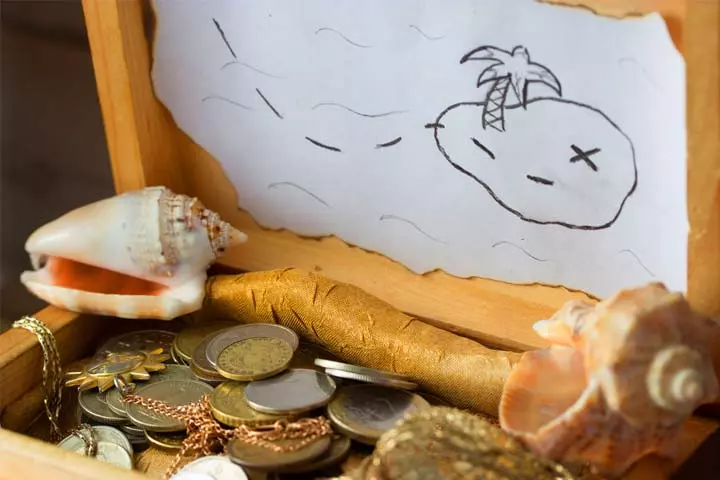
Kids love playing in the sand. Another fun twist to the game is to combine it with a classic favorite – hide-and-seek! So why not create a sensory game out of it?
You will need
A sensory bin or a big container, sand, coins, jewelry, etc.
How to do
- Hide the coins, jewelry, and other toys in the sand.
- Ask your little one to explore and find all the hidden treasure.
- To make it more exciting, ask them to find it within a time frame.
How it helps: Improves problem solving and gross motor skills.
14. Pasta sorting
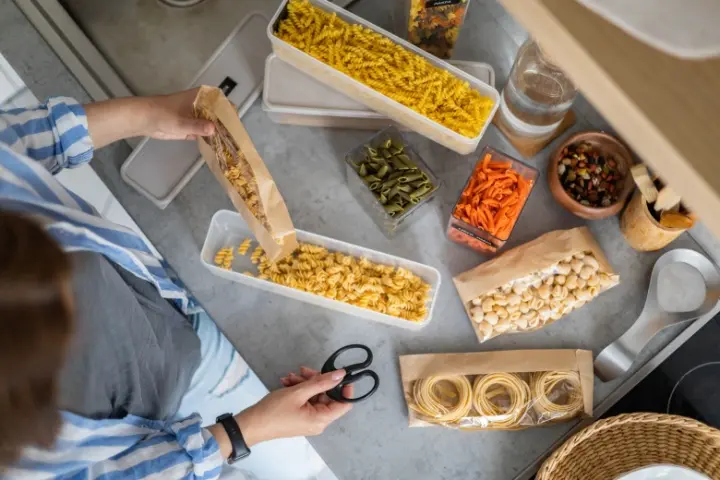
This is both a sensory and learning activity. If your kids are aware of colors, this activity helps improve their knowledge of different shades of colors.
You will need
Pasta, food color, color bowls, a big container.
How to do
- A day before the activity, take four portions of pasta, add different food colors to it, and dry it.
- On the day of the activity, mix the pasta in a big bowl, and keep the colored bowls beside it.
- Ask your kids to sort the pasta based on color.
How it helps: Introduces children to different colors and improves fine motor skills.
15. Transferring or shifting activity
Shifting objects from one container to another, or from one place to another, might be easy for adults. But for toddlers, it’s a challenging activity.
You will need
Two containers, small objects like toys, cushions, etc.
How to do
- Keep two containers at different places.
- Fill one container with toys.
- Ask your child to transfer them from one container to the other.
How it helps: Improves grasping skills and teaches sequencing.
Learning Activities
There is some learning in activities designed for children. However, certain activities are specifically targeted at teaching specific things like colors, letters, counting numbers, or names. Listed below are such learning activities that keep your three-year-old engaged and entertained.
16. Color and shape sorters

This is a fun activity to teach colors and shapes. Your toddlers would enjoy and also learn something new.
You will need
Objects in primary and secondary colors, readily available shape sorter set.
How to do
- Place primary and secondary colored objects differently.
- Teach your kids about the differences.
- Once they understand the differences, mix everything, and ask them to sort.
For teaching shapes
- Get readily available shape sorter games.
- Once they learn the shapes, take it to the next level by asking them to sort them.
- You can also introduce concepts such as stacking.
- Ask the child to stack the shapes, starting with the largest shape at the bottom and ending with the smallest shape on top.
How it helps: Helps children understand the concept of size and spatial relationships.
17. Learn letters and numbers

Teaching your preschooler letters and numbers at home is a good way to engage them.
You will need
Butter beans, marker, white chart.
How to do
- Mark the butter beans with letters and numbers.
- Draw vertical and horizontal lines to form a checkered design on the chart.
- Write the letters and numbers randomly in the blocks.
- Place the beans in a basket with the letters and numbers facing upward.
- Ask your kid to match the letters and numbers on the beans to that on the chart.
How it helps: Improves letter recognition, numeracy skills, and matching skills.
18. Play with puzzles
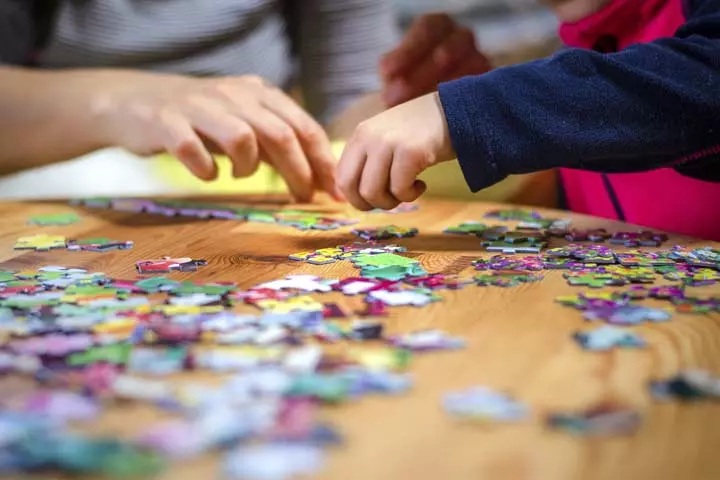
Puzzles are one of the most engaging problem-solving activities for toddlers. They are readily available and solving them can improve your child’s motor and reasoning skills. In older kids, it can also help improve their concentration ability.
You will need
A readability available puzzle set.
How to do
- Start with a small puzzle that has fewer pieces.
- Once your toddler masters it, slowly increase the difficulty level.
- Keep changing the puzzles to keep things interesting.
How it helps: Improves letter recognition, numeracy skills, and problem-solving skills.
19. Cook together
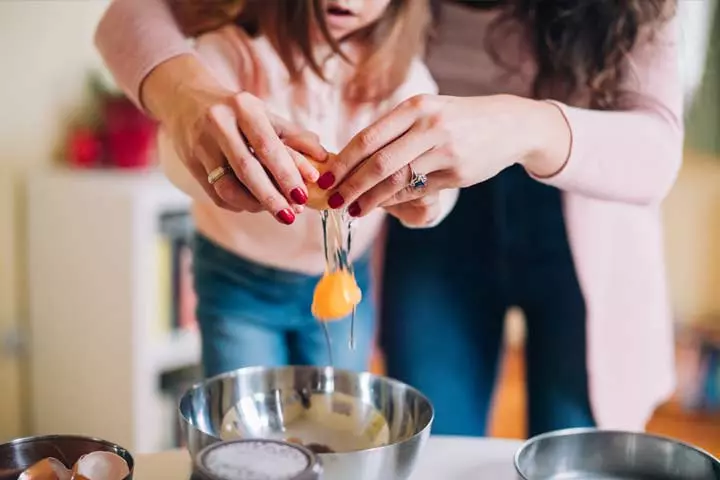
Cooking does not necessarily involve using the stove or fire. Teach your kids something that doesn’t involve serious cooking and let them discover the joy of real cooking.
You will need
Utensils, cutlery, and cooking items.
How to do
- Pick a dish and get the required items.
- You could make salads and sandwiches or bake cookies and cakes.
- Give the child small tasks, such as mixing the dough.
- You can either show them how to do it or do the task together.
- Let the child enjoy eating what they have prepared.
How it helps: Improves critical thinking, teamwork, and social skills.
 Did you know?
Did you know?Outdoor Activities
Playing outdoors is what makes the activity even more interesting and exciting for the kids. However, make sure you’re taking necessary safety precautions before planning any outdoor activities for your three-year-olds. Here are a few ideas for outdoor sports and games for three-year-olds.
20. Gardening
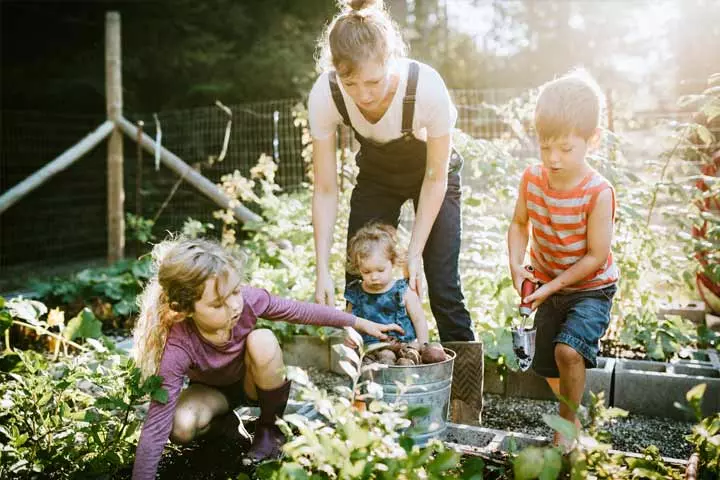
Gardening is a simple and interesting outdoor activity for a three-year-old. Teach them some basic gardening tasks like watering plants, pruning, planting, harvesting, etc.
You will need
A small watering can or a small bucket and a mug, kid-friendly scissors, etc.
How to do
- Take your kids around your garden and tell them a little about the plants you have in there.
- If they’re already familiar with the plants, go straight to the activity.
- You could ask them to help with tasks such as watering the plants.
- Show them how to do it so that they don’t over-water it.
- Teach them other steps in plant care such as pruning and adding fertilizer.
How it helps: Enhances sensory skills and helps them understand the importance of caring for the environment.
21. Backyard obstacle course

The backyard obstacle course is one of the most engaging outdoor games for toddlers. If you have three-year-old boys who are always on the go, they would surely love it. As it involves physical activity like running and jumping, it helps develop muscles, improves endurance, and aids in developing gross motor skills.
You will need
Anything available from your kids’ toys like boxes, flags, frisbees, hula hoops, balls, cones, etc.
How to do
- Design your obstacle course using the items you have.
- Ensure the path gets the kids to jump, crawl, run, walk, balance, skip, and slide.
How it helps: Improves gross motor skills and endurance, and supports muscle development.
22. Building sandcastles
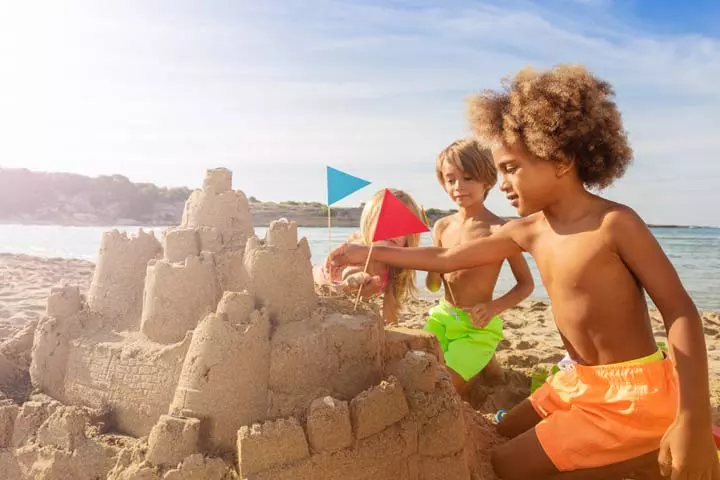
You can plan this in your backyard or on a nearby beach. Just take the kids to the sand, and they will know what to do. If they don’t, you can always show how playing with sand can be a fun activity.
You will need
Sandcastle set.
How to do
- Take your child to the backyard or a spacious play area.
- Gather some sand at one place.
- Give the sandcastle kit to your kids.
- Show them some sample sandcastle pictures.
- Let them make castles based on their imagination.
How it helps: Enhances fine motor skills, creativity, and imagination.
Indoor Physical Activities
We cannot always plan physical activities outdoors. You must have some indoor physical activity that allows your kids to move around. Listed below are a few ideas that you can try.
23. Walk like an animal
If your three-year-olds are familiar with animal sounds and behaviors, this would be an easy and interesting activity for them. You don’t need any items for this activity. Just show it to them and ask your kids to imitate you.
How to do
- Say the name of an animal .
- Ask your kids to imitate.
- If they don’t know, you can show them how and they can imitate you.
How it helps: Boosts cognitive skills, animal recognition, and body awareness.
24. Scavenger hunt
The regular scavenger hunt is a clue-based activity. But for the tiny tots, we modify the game a little to make it simple yet fun.
You will need
White papers, pens, baskets, etc.
How to do
- Prepare a list of items that your kids are familiar with in the house.
- Once the kids are ready, read out one item from the list.
- Ask the child to bring it and place it in a box.
- Once they find one, call out the next item, and the next.
- Keep calling the names of items till they find all the treasure.
How it helps: Improves their memory, cognition, comprehension, and vocabulary skills.
25. Dance party
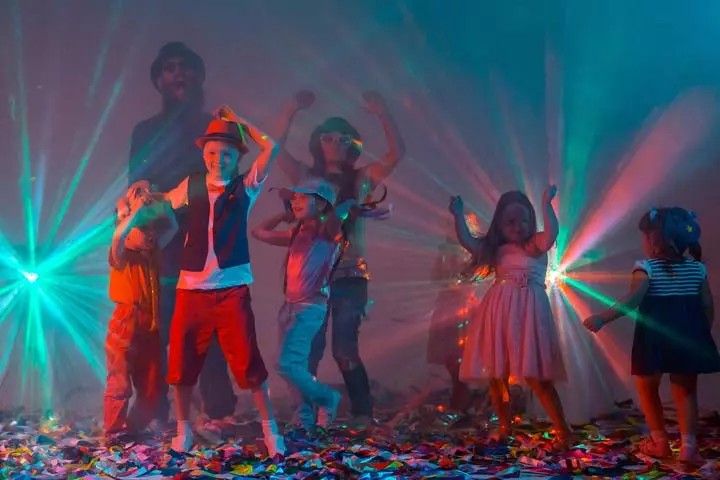
If you’re running short of time and ideas, one instant thing you can plan is a dance party.
You will need
Music system, some snacks, drinks, flashy lights, etc.
How to do
- Set up the dance floor with lights, music, snacks, and drinks.
- Get the children to move as they want to the music or teach them easy dance steps to try with you.
- Allow the children to play with musical instruments, if available.
How it helps: Improves gross motor skills, sense of rhythm, and emotional expression.
26. Indoor obstacle course

You can also plan an obstacle course indoors with some household items and some toys from your kid’s collection.
You will need
Chairs, tables, hula hoop, balance board, basket, skipping rope, play mat, and cushions.
How to do
- Design a simple obstacle course with five to six activities.
- Incorporate some of these ideas in the activity—crawling under the chairs, passing through the tunnel made using a playmat, skipping, balancing, throwing a ball into the target, somersault, etc.
- Place cushions on the floor to prevent injuries if the child misses a step and falls.
How it helps: Enhances spatial awareness, gross motor skills, and strengthens the core.
27. Yoga practice
Teaching good habits in childhood helps the kids become better adults. Yoga is one such activity that promotes overall well-being for all age groups.
You will need
A yoga mat, some reference yoga videos.
How to do
- Search some asanasi online that can be done by kids.
- Play them on the TV and ask your kids to follow them.
- Join them so that they find the activity interesting.
- Make yoga part of their daily routine so that they become habituated to it.
How it helps: Boosts physical development and mindfulness and improves posture.
Montessori Activities
Montessori activities are designed to encourage children to learn through play. These activities are designed to promote independent thinking, fine motor skillsiAbilities where one needs to use the small muscles in their hands, fingers, and wrists to perform specific movements. , and critical analysis right from childhood. As they’re tailored around a child’s areas of interest, they help the kids to learn quickly and easily. Listed below are some fun activities inspired by Montessori techniques.
28. Toy cleaning
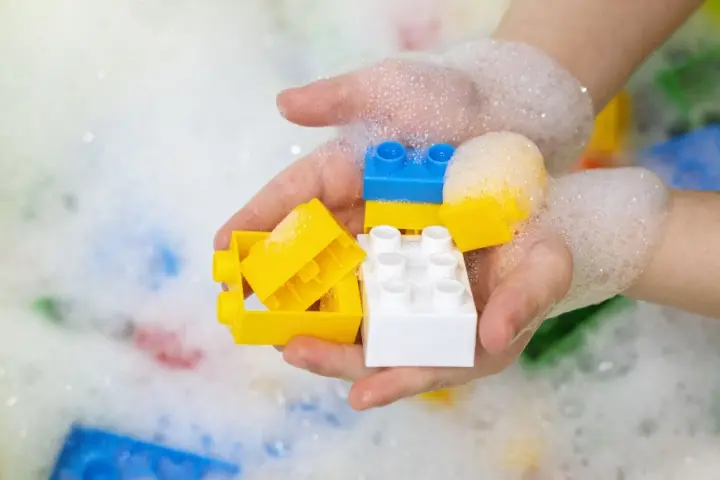
A simple but interesting activity for kids as it involves playing with water. It also teaches them some day-to-day activities that we do at home.
You will need
All the washable toys of your kids (preferably plastic and silicone toys), two water tubs, dish soap, a towel.
How to do
- Ask your toddlers to collect toys from all the rooms, sort them, and separate all the washable toys.
- Fill both the containers with water, maybe two-inches deep.
- Add dish wash soap to one container and make some water bubbles.
- Children love playing with bubbles thus making this a fun activity. Ask your kids to wash each toy at a time in the soap-filled container and then rinse it in plain water.
- Then keep them on a towel spread on the floor. Once all the toys are washed, they can wipe them with the towel.
How it helps: Improves gross motor skills and social skills and encourages independence.
29. Float and sink experiment
Let’s add some science to the fun. Teach the kids about sinking and floating with this simple water experiment.
You will need
A water tub, some natural items like leaves, twigs, flowers, stones, shells, etc., some water toys.
How to do
- Before starting the water play, get some items like leaves, flowers, stones, sticks, shells, buds, etc., from your garden.
- Place them next to the water tub along with the water toys.
- Now ask your kid to sit there and drop each item at a time. Tell him to observe which item is floating and which is sinking.
- Explain to them why some objects are floating and the others are sinking.
- Now remove everything from the water, ask questions, and then check their answers by dropping the objects.
How it helps: Introduces children to scientific concepts and helps them understand cause and effect.
30. Fruit cutting

Fruits and vegetable cutting is one of the Montessori food prep activities. This enables them to use both their hands and also teaches them some practical life skills.
You will need
An apron, water, kid-friendly peeler, knife, chopping board, etc.
How to do
- Choose soft veggies and fruits and a kid-friendly knife for enhanced safety.
- Ask the toddlers to clean all the veggies with water.
- Explain how each fruit needs to be cut in a certain way.
- Show them how to do it and then ask them to do it.
How it helps: Improves hand eye coordination, dexterity, and hand grip.
31. Hammering

Your three-year-old might be more interested in real tools than his regular toys. Well, why not let them explore the same with a kid-friendly tool set and activity.
You will need
You can purchase a readily available Nail game set that comes with all the necessary tools, including a corkboard, a wooden hammer, tack nails, some color cards, etc.
How to do
- Ask your kids to hammer the nails into the board by placing a plain paper in between.
- Once they master it, ask them to form shapes using some colored cards, pictures cut into pieces, etc.
- A variety of activities can be created using the hammering tool kit.
How it helps: Enhances fine motor skills, spatial awareness, and concentration.
32. Writing on a chalkboard
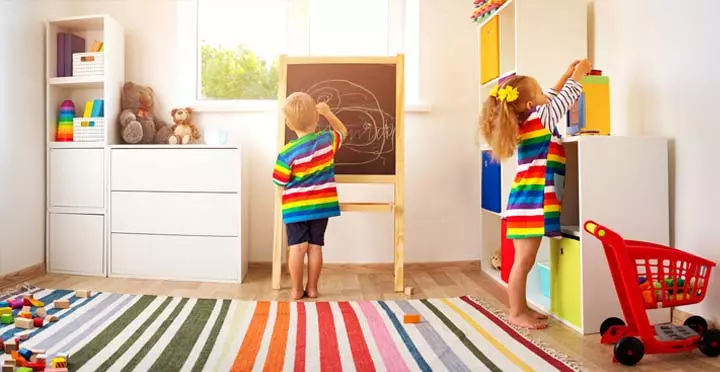
Every preschooler needs to get a good grip on pencils, chalks, or markers to develop writing skills. To avoid wasting paper, you can set up a chalkboard and offer them a clean canvas.
You will need
A blackboard, chalk pieces, board eraser, etc.
How to do
- Set up the blackboard in your kid’s playing corner.
- Give them chalk to scribble on it however they wish.
- If they are not comfortable standing and writing, place the board on the floor for a few days and let them practice.
How it helps: Improves their vocabulary and finger and hand movement.
33. Moving puzzle game
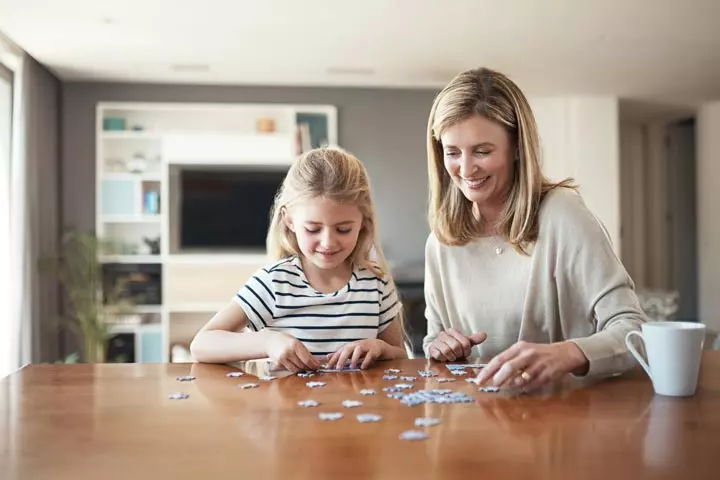
This activity gives a new twist to puzzles, making it even more helpful for further skill development.
You will need
Any puzzle game (preferably the one your kid is familiar with)
How to do
- Keep the pieces of the puzzle in a different room.
- Ask your kid to solve the puzzle in the play area by bringing one puzzle piece at a time.
- Increase the difficulty of the puzzles over time.
How it helps: Enhances gross motor skills, focus, and object recognition and categorization skills.
34. Window cleaning

Another popular Montessori activity is window cleaning. While spraying water on the windows is a thrilling sensory activity for kids, cleaning the windows improves their gross motor skills.
You will need
An empty spray bottle, white vinegar, water, a piece of cloth, or a sponge.
How to do
- Mix vinegar and water in the required proportion.
- Fill the mixture in the spray bottle.
- Hand the bottle and the cleaning material to the child.
- Show them how to clean the window.
- Let the child imitate you.
How it helps: Enhances coordination, tactile exploration, and practical knowledge.
35. Touch and tell
This is a sensory Montessori activity that encourages your kids to use their sense of touch to guess the things.
You will need
Small toys that your kids are familiar with, a big bag with a drawstring or a zip closure.
How to do
- Gather all the small toys your kids usually play with.
- Keep the toys in the bag.
- Blindfold your kids and ask them to pick one toy from the bag.
- Let them feel the toy for a minute.
- Ask the child to name it by just the feel of it.
How it helps: Encourages sensory exploration and improves problem solving skills.
36. Match the socks
Matching colorful things is one of the best Montessori activities to improve visual coordination in your kids.
You will need
Multiple pairs of socks.
How to do
- Mix all the pairs of socks.
- Ask your kid to pick one sock.
- Then, ask them to pick its pair.
- Repeat the process till all the socks are sorted.
How it helps: Enhances color recognition, classification, and problem-solving skills.
37. Pasta necklace activity
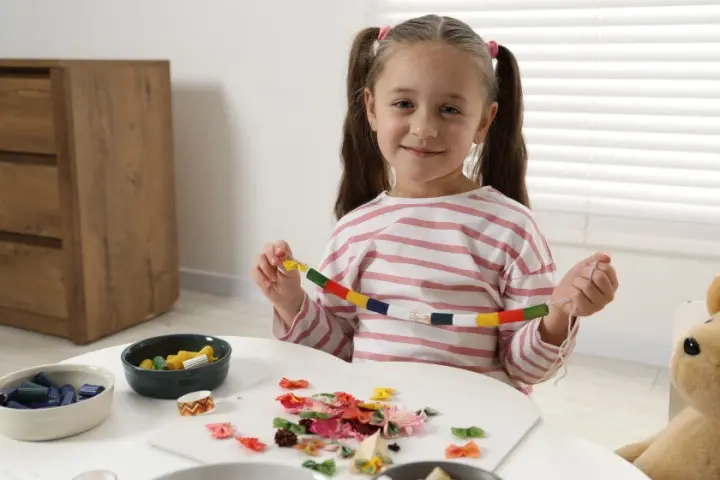
Your kids can have a colorful treat with the simple yet enchanting art of creating unique jewelry with dyed pasta.
You will need
Pasta, colors, yarn, duct tape, and scissors
How to do
- Start with dying the pasta in fun colors.
- Cut yarn for your kid’s necklaces, add duct tape to one end to make threading easier, and tie a pasta noodle to the other end so it doesn’t slide off when the kids add the other pasta noodles.
- Set up art stations for your little ones by using pallets covered with tablecloths. Display the colorful pasta in trays and let your kids find the yarn in a bowl.
- Invite your kids to the pasta necklace station and allow them to choose how long they want the yarn to be, then watch as they thread the dyed pasta, creating their special necklaces.
- Once the pasta necklaces are done, let them make extra jewelry for themselves or even for the grown-ups. These creative pieces make wonderful keepsakes to take home.
How it helps: Improves pincer grasp, concentration, and spatial awareness. Here is how mom and blogger Ana gave this activity a festive twist for St. Patrick’s Day. She writes, “For the centerpiece, I cut out a shamrock pattern from card stock and covered it with Mod Podge since it holds better than glue, and then sprinkled with glitter. Poke a hole through the center and loop through the yarn. We added a Cheerio here to help keep the shamrock in place upon my toddler’s request ;) (ii).”
Infographic: Waldorf Activities For Three-Year-Olds
Waldorf schools incorporate a balanced blend of cognitive, imaginative, and pragmatic instructions in their curriculum. These schools focus on the development of soft skills and moral values. It inspires life-long learning in students and enables them to focus on sharpening their innate talents. Save this infographic to learn some unique Waldorf outdoor activities.
Some thing wrong with infographic shortcode. please verify shortcode syntax
Frequently Asked Questions
1. What are some tips for planning activities for three-year-olds?
You may keep the activities simple and safe while ensuring that the child enjoys them and gets to explore their surroundings. Activities emphasizing socialization are also preferable since they are fun and provide avenues for interaction with other children.
2. What activities help promote language development in three-year-olds?
Reading books, storytelling, singing nursery rhymes and songs, playing pretend, asking open-ended questions, playing with blocks and puzzles, role-playing conversations, and exploring nature are all great ways to develop language skills in children, including three-year-olds.
3. How can I encourage my three-year-old to participate in activities?
Making the activity fun is the best way to entice a three-year-old to play a game or try an activity. Other ways include leading by example, being creative, and positive reinforcement.
4. How can play-based learning benefit my child?
Play-based learning is important for preschoolers and kindergarteners, as it helps spark their creativity and improve their problem-solving and socializing skills. Through play, kids discover the world, practice speaking, and improve motor skills in a fun way.
Introducing toddlers to learning activities for 3-year-olds will help keep them engrossed and entertained and enhance their creativity, focus, and cognitive abilities. Ensure you pick the right activity for your toddler as per their interest and abilities. Sensory developmental activities such as making art and crafts, frozen treasures, and Smell it and Tell it will help improve their sensory and motor skills. You may also try the various learning activities and outdoor and indoor activities mentioned above to aid your child’s physical and psychological development.
Illustration: Fun And Interesting Learning Activities For 3-Year-Olds

Image: Stable Diffusion/MomJunction Design Team
Personal Experience: Source
MomJunction articles include first-hand experiences to provide you with better insights through real-life narratives. Here are the sources of personal accounts referenced in this article.
i. Toddler craft activity – Playing with shapes in salt dough!!https://crafteaclasses.blogspot.com/2013/05/toddler-craft-activity-playing-with.html
ii. DIY Rainbow Necklace for St. Patrick’s Day;
https://mommysbundle.com/diy-rainbow-necklace-st-patricks-day/
References
- Developmental Milestones: 3 to 4 Year Olds
https://www.healthychildren.org/English/ages-stages/preschool/Pages/Developmental-Milestones-3-to-4-Year-Olds.aspx - The Growing Child: 3-Year-Olds
https://www.stanfordchildrens.org/en/topic/default?id=the-growing-child-3-year-olds-90-P02296 - Important Milestones: Your Child By Three Years.
https://www.cdc.gov/ncbddd/actearly/milestones/milestones-3yr.html#:~:text=Children%20this%20age%20are%20starting
Community Experiences
Join the conversation and become a part of our nurturing community! Share your stories, experiences, and insights to connect with fellow parents.
Read full bio of Dr. Maymunah Yusuf Kadiri
Read full bio of Nisha Bharatan
Read full bio of Rohit Garoo
Read full bio of Vibha Navarathna







